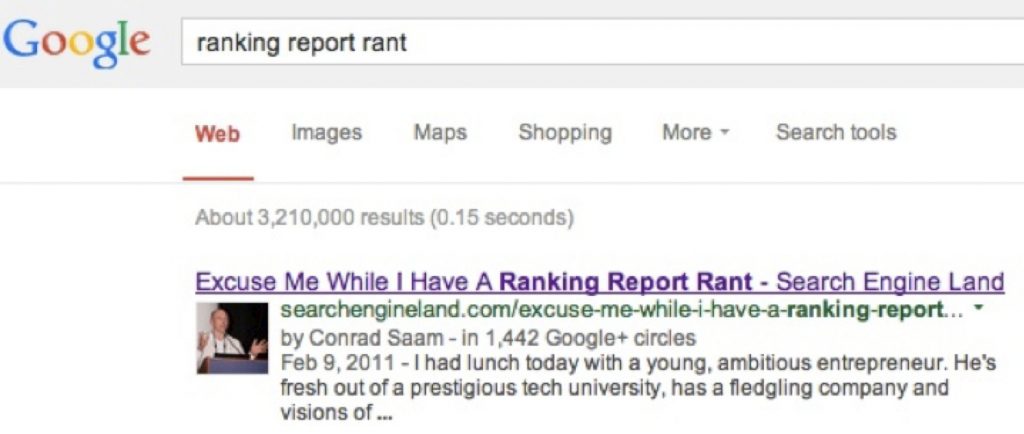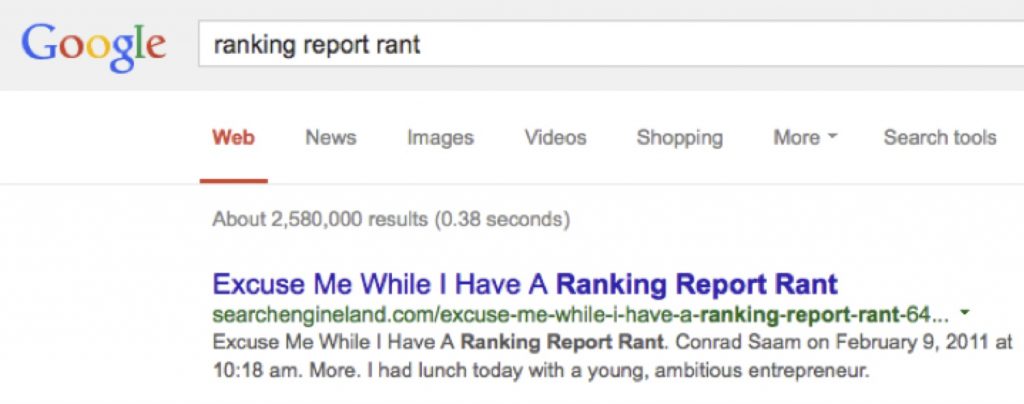Google Authorship is Dead (or is it . . . .)
Last week, John Mueller over at Google announced authorship would no longer be shown in search results. In case you forgot, authorship was the nifty gizmo that made your picture appear in the SERPs next to content you wrote. Or at least, it did until this past June when Google removed the photo and just left your name.
Here’s what Google Authorship looked like in its glory days:
And here’s what it looks like with the removal of authorship:
boo boo! Sad Trombone . . .
Why did Google (say they) got rid of authorship?
In their analysis of authorship, Search Engine Land cites two reasons. First of all, a low adoption rate by authors. Not many authors were implementing authorship code, suggesting that many content providers weren’t interested in it or didn’t understand how to use it. Secondly, a low value to searchers. Although authorship was originally intended to provide users with another indication of the validity of your content, it turns out that seeing your pretty face wasn’t really helping decision making.
Why do (we think) Google got rid of authorship?
Generally at Mockingbird, we take most of what Google says at face value. BUT – – – let me uncharacteristically offer a contrarian view: Google got rid of authorship because we (the scummy, spammy) SEO industry transformed it from a positive quality signal into a spammy marketing tactic. Especially within legal – where social media marketing consultants and SEO hacks desperate to demonstrate some tangible benefit to their clients went overboard with authorship. Remember how FindLaw spammed authorship by attributing blog posts from old clients to their new clients? Hardly a legitimate quality signal and FindLaw wasn’t the only one. My take is that it is highly possible that Google has removed the tangible benefit of authorship (that ego-boost of your picture right within the results that made lawyers salivate and social media marketing something to do) but has quietly held on to the concept of author rank. Getting rid of “authorship” is going to remove (some) of the low quality signals that SEOs foisted into the author rank concept.
What does this mean?
Thankfully for website owners, Mueller says, “removing authorship doesn’t seem to reduce traffic to sites,” so you shouldn’t be too concerned on that front. However, folks in the SEO community have been spending time and energy on this since 2011, when authorship was first introduced.
Authorship was always about much more than the silly little picture . . . and for our clients we’re staying the course – building the authority of individuals.



Hi Sam,
I agree entirely that an image next to links in Google does not make an authoritative individual .
However, although I think SEO is often a “scummy, spammy” trade, I won’t go as far as to blame SEOs for the cancellation of Google Authorship.
The presence of author images in SERPS for our clients was optimal while the tool existed, so we implemented it.
In my experience, traditional SEO clients are rarely prepared to invest what it takes to become the “authoritative individuals” that you refer to. That’s why they’re investing in SEO and not in blogging, or content marketing, or social media, all of which require a personal commitment and real business development skills.
And I know SEOs want to think that blogging, and content marketing, and social media are all a part of SEO. But they aren’t.
Blogging and content marketing and social media are not sub-sets of SEO; they are subsets of inbound marketing (earning traffic rather than buying ad space which leads to traffic), of which SEO is also a sub-set.
Successful SEO does not require successful content marketing, just as successful content marketing does not require successful SEO.
When we implemented authorship for our clients we were search engine optimizing. What other option did we have?
Matt – overall I couldn’t agree with you more . . . my conjecture is that it was the abuse (and we saw tons of it in legal specifically) of authorship that has made Google step away from it (at least publicly).
Thanks for the response, Sam.
No doubt yours is a compelling and logical theory. I sure would love to see numbers from Google in terms of what % of authorship accounts they considered to be spam (this would never happen). I agree that legal made up a big percentage of that percentage.
I called you Sam when your name is Conrad, so you win the debate.
I still believe in the fact that authorship is never dead! Though it is hidden from the eyes of Google , I find it is still worth it and could just make sense to the users as well as readers.
There’s no change in traffic after Authorship died. I guess Google is right then. In my point of Google Authorship doesn’t have any impact on ranking and search results.